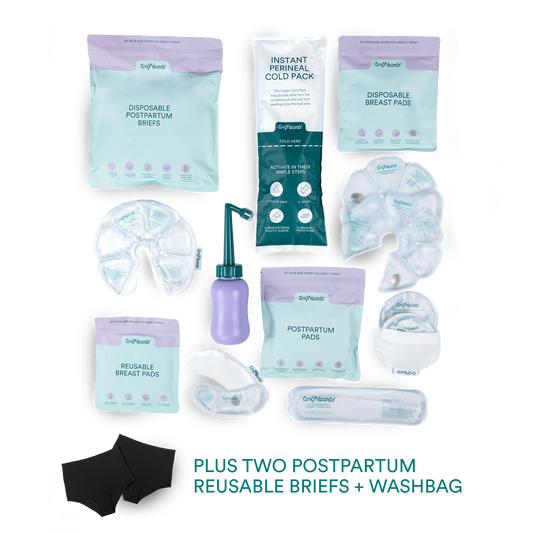Warning: you’re about to read a whole lot of dirty talk.
And by dirty, we mean it - because we’re here today to talk about baby poo! Becoming a parent will open your eyes to an entirely new world of experiences, but the one thing that surprises most newcomers is the fascination with their child’s poo.
Due to our little one’s inability to communicate, their poo can reveal a lot about their health.
So what should I be looking out for? You ask.
Well sit back, relax and prepare yourself to read the biggest load of crap you'll hear today.
Bub’s First Poo
Though seemingly un-eventful, your babies’ first poo is super important!
Referred to as meconium, their first poo is made up of everything your baby ingested while in the womb, including amniotic fluid and mucus. Bubs first poo will be a dark green or black colour and will have a sticky, tar-like consistency. This colour will eventually evolve into a yellow or brown shade by day four.

How Often Should my Baby be Pooping?
In general, you can expect a newborn to poo after each feed, but the actual frequency of your bub’s bowel movements will depend on whether they’re breastfed or formula-fed.
Breastfed
Because breastmilk is digested differently to formula, the frequency of poo’s can be quite unpredictable when it comes to breastfed babies.
Breastfeed babies will sometimes poo after every feed or will poo once every few days and both are totally healthy. The important thing to look for is how easily your bub is passing poo, if it’s soft and stress-free then they’re a-okay!
Formula Fed
In contrast to breastfed babies, formula-fed babies are more likely to be pooing machines from day dot. Bub’s who take formula will most likely poo at least once a day, with some newborn’s pooing five times a day!
Unlike breastfed babies, formula-fed babies are more susceptible to constipation, so it’s important to monitor your bub if they haven’t pooed for two or more days.
Colours of Poo
We’d like to introduce you to the baby poo rainbow. These are all the colours you can potentially encounter when conducting the daily nappy change. But what do they all mean?
Yellow
For breastfed babies their poo will often range in colours from yellow to light green compared to formula-fed who’s stools can range from creamy-yellow to dark green.
Orange
Orange poo can be a result of multiple factors! Once solid foods are introduced, they will impact your bub’s poo and alter the colour. For example, if you’ve fed your baby pureed carrot for lunch then their poo will most likely be orange.
Red
Red poo is another poo that can be caused by multiple culprits. If the poo appears to have red flecks and your baby is constipated it’s probably because bub is straining and finding it hard to poo.
Red poo can also be caused by blood swallowed from Mum’s cracked nipples or solid foods such as beetroot.
In other cases, red blood may be a sign of infection, allergy or other medical concerns. If you suspect this is the case, or have any concerns at all, please see your GP immediately.
Black
In newborns, if their poo is still black by the fourth day of life it could be a sign that bub isn’t digesting milk properly or receiving adequate nutrition.
In older babies, black poo can be a result of iron in the diet which isn’t a concern. However, if bub doesn’t have excess iron in their diet, such as supplements, it could be a sign of GI tract bleeding. If you suspect this is the case, please see your GP.
White or Grey
If your bub is eating solids, poo may appear grey depending on what they’ve eaten.
In severe cases, stools that appear white or grey in colour can be signs of liver or gallbladder problems. Please see your GP if this presents and take the nappy with you (gross I know, but it’ll help the doctor identify any issues!)
Dark Green or Greenish Tan
A poo colour that’s often a bit a sneaky. Though most healthy baby poos will be mustard yellow in colour, normal baby poo can also be greenish tan in colour. It’s also a sign that your bub is teething or that they are recovering from a stomach bug.
If your baby is formula-fed and is increasingly fussy and uncomfortable, it could be a sign of a cow’s milk allergy or intolerance to the formula.
If your baby is formula-fed and their poo appears dark green, this can merely be the result of iron in the formula which can alter the colour of the poo. This is totally fine.
Bright Green
If bub is breastfed and their poo is bright green and frothy, this could mean that they are getting too much fore-milk and not enough fatty hind-milk.
Poo to Watch Out For
Like colours, poo can come in all shapes and sizes, consistencies and textures and like poo colours some are good, and some are bad.
Diarrhoea
It’s not hard to identify if your baby is suffering from diarrhoea, some the key indicators include:
- Runny, watery stools
- More frequent poos or passing larger amounts than usual
- Explosive or squirting poo (beware of wearing white clothing when changing nappies!)
Diarrhoea is more common in formula-fed bed babies because breastfed babies ingest nutrients from breastmilk that help prevent bacteria that often causes diarrhoea in infants. However, all babies can develop diarrhoea.
Common Causes of Diarrhoea:
- Infections
- Too much fruit (e.g. prunes and plums)
- Food allergy or intolerance
- Reaction to medication
Diarrhoea often clears up within 24 hours without any treatment. If this period exceeds and your baby has had more than six cases of diarrhoea within that 24 hour period, please see your GP.
Constipation
Nothing says an uncomfortable baby like constipation. You’ll often be able to tell if your bub is suffering from constipation when:
- They strain or cry when doing a poo
- Stools look similar to rabbit poo, which can be small and dry or large and hard
- Their tummy feels hard - this is caused by hard lumps of poo
- They eat less and are irritable
Common Causes of Constipation:
- Dehydration
- Bowel habits - such as ignoring the urge to poo
- Changes to your babies diet and drinking habits
- Medications
- Anal fissures (small splits of the skin around the anus which cause pain and bleeding to the bottom when pooing)

Help! My Baby won’t Poo!
There are plenty of reasons why your little one may not be pooing, and there’s nothing worse for a parent than seeing your bub uncomfortable - because let’s just admit it, a poo has the ability to provide sweet relief!
If your baby isn’t pooing try out some of these handy methods:
- Peddle your baby’s legs like they’re riding a bike. In infants, this helps kick-start their digestive system
- If your baby is constipated, it can often be a result of dehydration. Water and juice can assist in loosening the stools and help them to move along
- Warm baths are also a handy way to fill a nappy. Warm water can relax muscles which in turn will help the baby poo
- If your baby is having solids, you can try to incorporate veggies with a high-fibre content or wholegrain such as brown rice which can soften stools.
Sources
www.betterhealth.vic.gov.au
www.rch.org.au
www.thebump.com
www.babycenter.com.au
www.kidspot.com.au








